Serving 888 students in grades 7-9, Tamanend Middle School ranks in the top 50% of all schools in Pennsylvania for overall test scores (math proficiency is bottom 50%, and reading proficiency is bottom 50%).
The percentage of students achieving proficiency in math is 35% (which is lower than the Pennsylvania state average of 36%). The percentage of students achieving proficiency in reading/language arts is 70% (which is higher than the Pennsylvania state average of 55%).
The student:teacher ratio of 14:1 is higher than the Pennsylvania state level of 13:1.
Minority enrollment is 29% of the student body (majority Hispanic and Asian), which is lower than the Pennsylvania state average of 39% (majority Hispanic).
Quick Stats (2025)
- Grades: 7-9
- Enrollment: 888 students
- Student:Teacher Ratio: 14:1
- Minority Enrollment: 29%
- Overall Testing Rank: Top 50% in PA
- Math Proficiency: 35% (Btm 50%)
- Reading Proficiency: 70% (Top 30%)
- Science Proficiency: 58% (Btm 50%)
- Source: National Center for Education Statistics (NCES), PA Dept. of Education
School Overview
Tamanend Middle School's student population of 888 students has stayed relatively flat over five school years.
The teacher population of 62 teachers has grown by 12% over five school years.
Grades Offered
Grades 7-9
(offers virtual instruction)
(offers virtual instruction)
Total Students
888 students
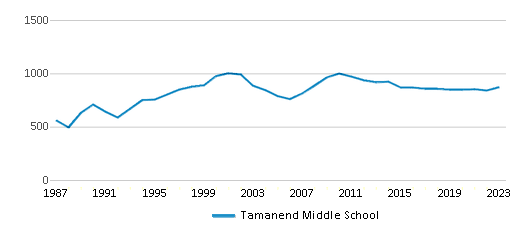
Gender %
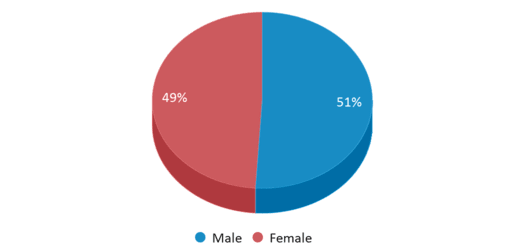
Total Classroom Teachers
62 teachers
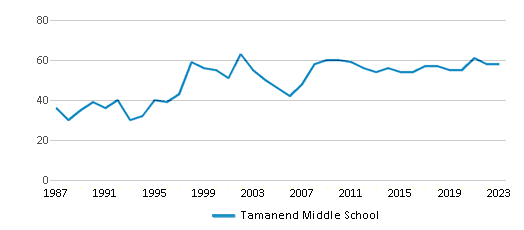
Students by Grade
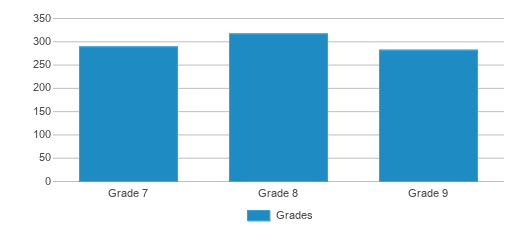
School Rankings
Tamanend Middle School ranks within the top 50% of all 2,733 schools in Pennsylvania (based off of combined math and reading proficiency testing data).
The diversity score of Tamanend Middle School is 0.47, which is less than the diversity score at state average of 0.59. The school's diversity has stayed relatively flat over five school years.
Overall Testing Rank
#1108 out of 2733 schools
(Top 50%)
(Top 50%)
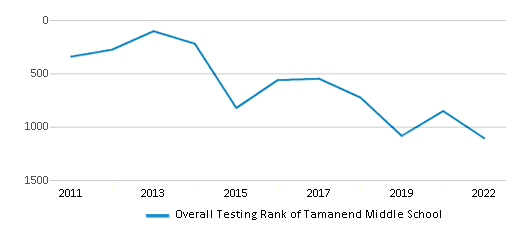
Math Test Scores (% Proficient)
35%
36%
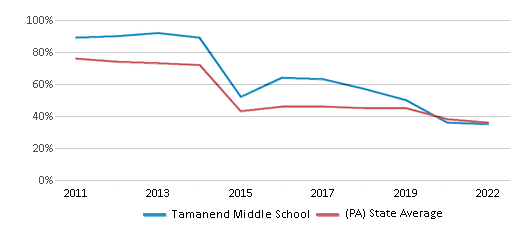
Reading/Language Arts Test Scores (% Proficient)
70%
55%
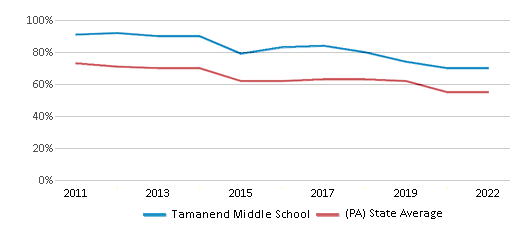
Science Test Scores (% Proficient)
58%
57%
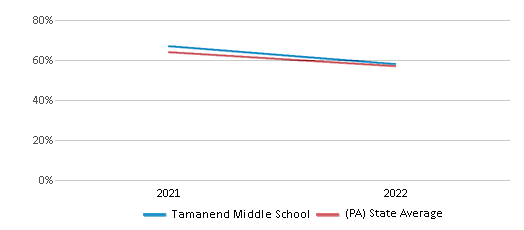
Student : Teacher Ratio
14:1
13:1
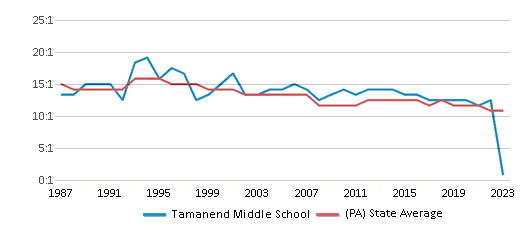
American Indian
n/a
n/a
Asian
12%
5%
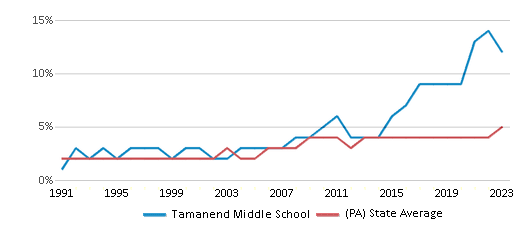
Hispanic
13%
15%
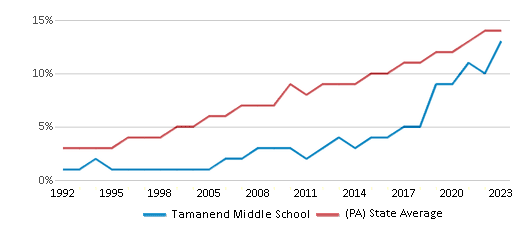
Black
1%
14%
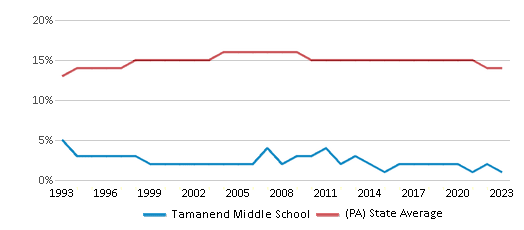
White
71%
61%
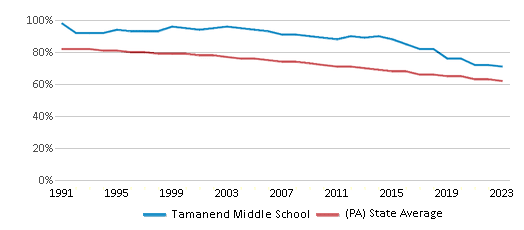
Hawaiian
n/a
n/a
Two or more races
3%
5%
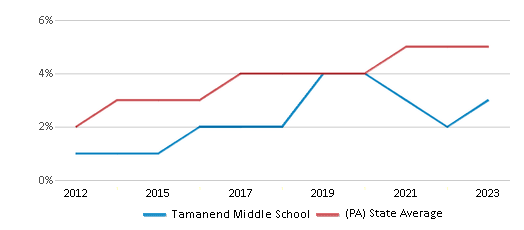
All Ethnic Groups
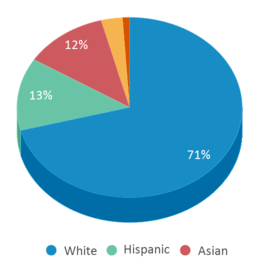
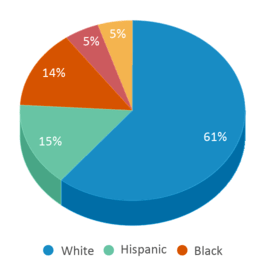
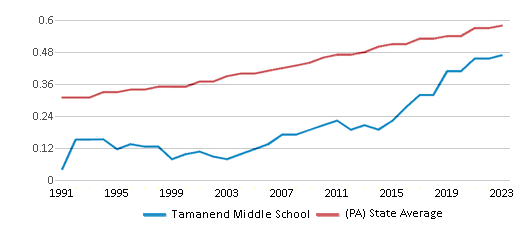
Participates in the National School Lunch Program (NSLP)
Yes
Eligible for Free Lunch
18%
60%
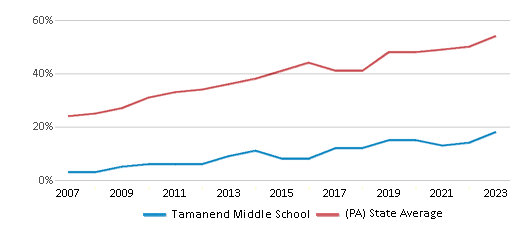
Eligible for Reduced Lunch
2%
2%
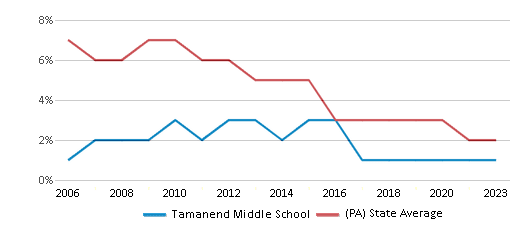
School Statewide Testing
School District Name
Source: National Center for Education Statistics (NCES), PA Dept. of Education
Profile last updated: 02/09/2025
Frequently Asked Questions
What is Tamanend Middle School's ranking?
Tamanend Middle School is ranked #1108 out of 2,733 schools, which ranks it among the top 50% of public schools in Pennsylvania.
What schools are Tamanend Middle School often compared to?
Tamanend Middle Schoolis often viewed alongside schools like New Hope-solebury Middle School by visitors of our site.
What percent of students have achieved state testing proficiency in math and reading?
35% of students have achieved math proficiency (compared to the 36% PA state average), while 70% of students have achieved reading proficiency (compared to the 55% PA state average).
How many students attend Tamanend Middle School?
888 students attend Tamanend Middle School.
What is the racial composition of the student body?
71% of Tamanend Middle School students are White, 13% of students are Hispanic, 12% of students are Asian, 3% of students are Two or more races, and 1% of students are Black.
What is the student:teacher ratio of Tamanend Middle School?
Tamanend Middle School has a student ration of 14:1, which is higher than the Pennsylvania state average of 13:1.
What grades does Tamanend Middle School offer ?
Tamanend Middle School offers enrollment in grades 7-9 (offers virtual instruction).
What school district is Tamanend Middle School part of?
Tamanend Middle School is part of Central Bucks School District.
School Reviews
1 12/6/2018
There is an embedded bullying problem at this school and it is disheartening to discover that actually it appears the bullies are basically given lisense to do whatever they want. We have tried everything to encourage a better response among administration, but it appears the students that suffer the assaults are left feeling they do not matter and are on their own. A huge problem at this school! This could be easily addressed and such a difference made if motivated individuals were in place who really cared. Be very aware before you place your child here. If your child is popular though, they will be treated like royalty.
4 11/2/2018
Generally a good place. Some subpar teachers and a few bullies, but generally good.
5 2/26/2018
I think this is an amazing school! Many of the teachers and staff are nice and appreciative.
2 6/1/2012
This school has as overwhelming issue with bullying. The staff doesn very little to rectify and issue strong actions agenst kids who bullying.
Review Tamanend Middle School. Reviews should be a few sentences in length. Please include any comments on:
- Quality of academic programs, teachers, and facilities
- Availability of music, art, sports and other extracurricular activities
Recent Articles

What Is A Charter School?
Explore the world of charter schools in this comprehensive guide. Learn about their history, how they operate, and the pros and cons of this educational innovation. Discover key facts about charter schools, including admission policies, demographics, and funding, as well as what to look for when considering a charter school for your child.

10 Reasons Why High School Sports Benefit Students
Discover the 10 compelling reasons why high school sports are beneficial for students. This comprehensive article explores how athletics enhance academic performance, foster personal growth, and develop crucial life skills. From improved fitness and time management to leadership development and community representation, learn why participating in high school sports can be a game-changer for students' overall success and well-being.

February 05, 2025
Understanding the U.S. Department of Education: Structure, Impact, and EvolutionWe explore how the Department of Education shapes American education, from its cabinet-level leadership to its impact on millions of students, written for general audiences seeking clarity on this vital institution.









